
A Pale Horse Named Death are a five piece who are currently leading the charge for accessible, powerful and melancholic doom. Heavily influenced by the legendary Type O Negative, a band which Sal Abruscato was a founding member of, and aided along by influences from the 80’s and 90’s goth and new wave scene, APHND are going from strength to strength. After a hiatus of sorts due to other projects, the band have hit the ground running with several tours, a new album and a special EP. With things looking promising in the near future, I managed to take up a short space of Sal’s time to talk about the new album, his musical influences, the double-edged sword of being associated with iconic bands when doing your own thing and of course, the legacy of Type O Negative and Pete Steele.
AN: First things first – how was Damnation Festival?
Sal: It was incredible. We were honoured to play there.
AN: Would you perform there again if offered the chance?
Sal: Absolutely. We know that these things usually come round once every few years so I wouldn’t expect to be instantly invited back, but I would definitely go there again! The crowd was great and we had a real good time.
AN: Yeah, I know that feeling. I haven’t been since 2015 but it is always a special day in the UK gig and festival calendar. I first went back in its early days when it was held in Manchester in the nightclub “Jilly’s” and The Haunted headlined it then. Now that it has moved to Leeds, it has gone from strength to strength and the quality of the bands they have pulled is incredible.
Sal: Yeah, it certainly does feel like a big deal.
AN: Getting the customary praise for the release in, “When The World Becomes Undone” is one hell of an album. It’s atmospherically charged and the overall sound is pretty solid – killer guitar and bass tone, those iconic Johnny Kelly drums and your vocals which work in great synergy with the ambience and feel of the release. It’s probably one of the most wonderful sounding bleak things I have listened to in the past few years, so with the album being out now for coming up to a year, what is your take on it? Has your opinion on it changed at all?
Sal: No, my opinion of it hasn’t changed. The last release we put out was in 2014 so it was a long time coming. Basically, it was something I needed to get out because I needed to progress forwards with the music and begin to write the next level of the material. I needed to get this album out because it was something we needed to do and now it leaves me excited for the fresh material that is coming in my mind. I’m hoping to start sketching things out now, over the winter, you know the holidays and stuff. I’m hoping to start tracking songs, getting the melodies and the vocals down. I look at it this way, If I don’t wanna do it anymore, I don’t need to rush, but I feel that this time, because I made the fans wait so long for the third album, I have to get the music to the next level – a blacker atmosphere, pull out the demons from all the corners. [Sal gives an evil chuckle].
I’m kinda anxious because I wanna start getting the ideas down. Every day in soundcheck I’m just throwing out these ideas and I just wanna get them together and down.
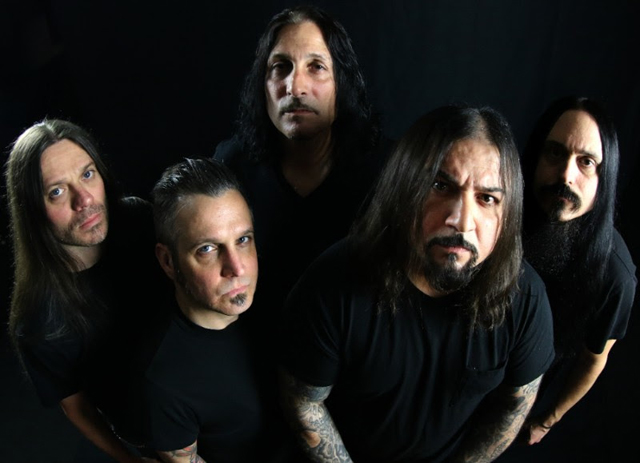
AN: Sweet! So, this follows on/links in to the previous question, one which you are probably asked all the time but here it comes anyway; what is your favourite track on the album?
Sal: Well, I think there’s “When The World Becomes Undone”, that’s a track we don’t play live at the moment because of its complexity, you know the piano parts and that.
AN: Well… There is a piano by the stage in the venue. Maybe a little on the fly set list improvisation and jamming it out? [Interviewer smirks and laughs, in turn getting Sal to laugh a little]
Sal: I don’t think we will be trying that! I’d like to perform it on stage with an actual pianist on stage so I can do what I do and the song the justice it deserves. Back to your question, I also enjoy “Love The Ones You Hate”, the guys really dig “Vultures”, that is one they love… “End Of Days” is a really cool song… I mean it’s really hard to single out just one track as a favourite. I mean they’re all my children, whether they’re bastards or not, I love them all. I don’t like picking a favourite but I do enjoy playing some songs more than others
AN: I’m a sucker for a good catchy hook; be it a sweet riff, catchy lead progression or nicely executed drum fill. “Love The Ones You Love To Hate” is loaded with them! The song is so infectiously catchy and easily one of the best on the album. When listening to it, it was really easy to start hearing bits and pieces of the old 80’s “new wave” and “goth” scene – bands like The Sisters Of Mercy, The Mission and The Cult instantly sprung to mind. How much did bands like those actually influence you on this record? Was it the kind of sound you were aiming for?
Sal: I wouldn’t say I aimed for that sound, more like gravitated towards it. That sound is something I gravitate towards. It reminds me of when I was in the 90’s and going round the clubs in the city by myself in the middle of the night. I’d be watching all the Goth people dancing to all these cool songs and it led me to owning a lot of records which were related to that stuff. It just catches my ear, like for example, the other day I heard this group or DJ/Mixer called ‘Cabaret Nocturne’ and this piece of music made me look it up and what I heard, it made me picture this dark and smoky place with people dancing in the midst of it… And I like that kinda upbeat feel it has, I like that catchy beat… You know, what we call Ear Candy.
AN: What about Life Of Agony? How much of an impact have their sound had on APHND?
Sal: Absolutely nothing! Life Of Agony have no impact. What Life Of Agony influenced is the bitter situation between us where “Love The Ones You Hate” is about them a little bit. They have no influence other than that, nowhere near us. One of the reasons I wanted to leave them again was because Life Of Agony always left me ‘short-changed’ with musical challenges that I have always hungered for. Those guys are not theoretically trained, they’re kinda like One-Trick Ponies with what they do, they don’t progress.
I know everyone seems to be digging their new album and that’s cool for them but had I been in the band, I would have not been happy playing that material. For me, they should have changed just their name because for me, they’re not Life Of Agony doing what I was doing with them years ago… And even on the album prior, the one I did a lot of writing and arranging on, that is why it had some darker moments… They always left me yearning for a musical challenge, they always left me yearning to go heavier and doomier. They never satisfied me in that kinda way musically.
AN: So there was no influences at all then huh? Not even a tiny bit?
Sal: They paid my bills. Honestly, I was never in love with that music, I was in that band, I just had to do what I had to do. Yes, we were friends, we had some good times and we had some bad times too. Musically I was always left lacklustre and it was like [Sal rolls his eyes and mimes out a simple drum fill] ‘O-kay, here we go…’ and they’re just a One-Trick Pony type of band making money. For me, it was how I knew I had to get back to that heavier sound; writing my music and making this record. I think when they caught wind of this, they weren’t so keen on the idea of me wanting to move away a little bit and then it got ugly and they kinda pushed me so I was like ‘O-Kay I’m out! Good Luck”.
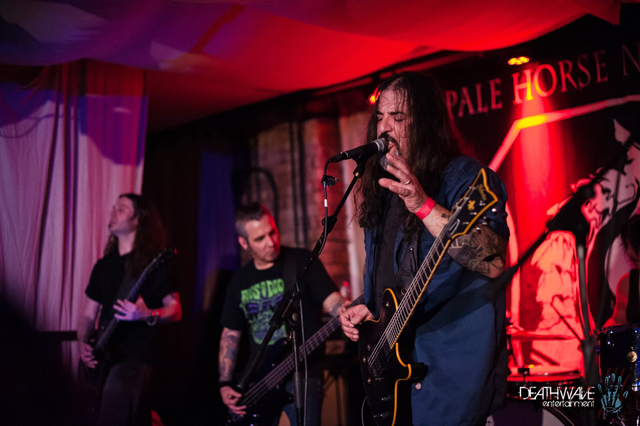
AN: Right. Here comes the question you usually hear – how much of the influence was from Type O Negative?
Sal: I learned song writing from Peter. He was the reason why I picked up the guitar and the bass back in the early 90s. He was the one who helped get me into this stuff; we were trading music with each other, getting me into all these bands we would hear in those clubs; Swans, New Order, My Bloody Valentine.. That “Blue Monday” Sound, the whole Depeche Mode sound. We both took a really big liking to it at the same time.
Peter was to me, a great teacher. I would analyse his way of song writing and his arrangements, they really inspired me and I’m grateful forever to him.
AN: For me, outside of the colossal down-tuned sound and mood, it comes across like a mixture of Bloody Kisses and World Coming Down; you’ve got that gothic vibe and personality from Bloody Kisses and then…
Sal: That drop. It all comes crashing down.
AN: Yeah, that massively heavy factor of World Coming Down! It just all fits together in the right way.
Sal: Peter challenged me as a musician. He pushed me and made me a great drummer, he taught me how to do stuff which was out of the norm. Not just as a musician, but in the studio too. I watched him, I analysed him. I’d stay behind even after all the drum parts were done and watching him at work, looking back, I always felt I had something to gain from just being there with him.
AN: Yeah, I see where you are coming from. I’ll admit, I’m an average guitarist and bassist at the best of times and I can just about play a few Type O Negative songs! There is a challenging element to the material he created, whether it’s the technique or the sound!
Sal: [Smirks] Ha! It’s all in the fingers. You could give someone the exact same instrument and set up and I guarantee it wouldn’t sound the same. It is all in the positioning, in the approach of the hand, the way of bending the strings, sliding between the notes and the pick-slides. Peter was really big on the single string approach, where most guys would go [miming a progression], Peter and now myself, we go [mimes the same progression but a different arrangement of it]. We do it all on the same level, instead of playing ‘The 5’ on the string above, we play ‘The 10’ on the string we are predominantly using… You know, like “Black Number One” as an example, and more relevant; “Love The Ones You Hate”, it’s like [Sal hums the chord melody and mimes out the positions on the fretboard]. It’s all on the same string and that is what gives it the sound it has.
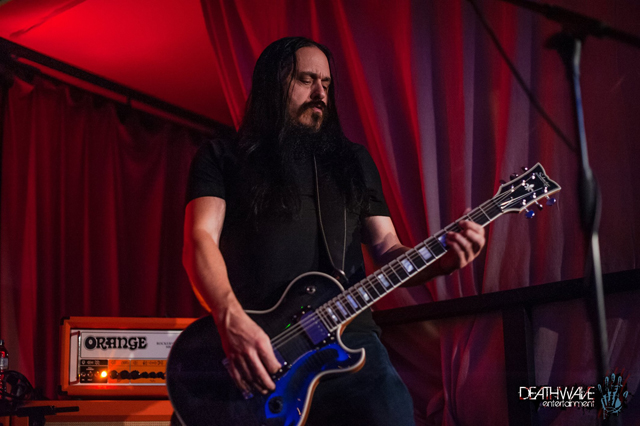
AN: If it was me trying that, I’d probably play the chord in a totally different place! [I mime the chord shape and Sal laughs].
The recording process – how did it go? Did you approach anything differently on this record compared to the previous APHND albums? Any last minute tracks suddenly spring to life or was everything pretty much laid out and loosely formed before you went in?
Sal: The only real difference was Matt Brown wasn’t in the band. Matt was my production partner on the previous records and with him doing his own thing, we had to do things a little differently; Eric (bass) offered so we took a shot at it together. There were not really too many hiccups, it was just a little different. I asked Matt a few times if he wanted to do the record with us but he declined and that was cool, he had his own things to do, so that was the change we went through on this record.
I don’t know what I wanna do with the next record; keep it the same as this one or again, do something different, work with different people, it’s just an ever-lasting experience. To me, the most important thing though is the song writing. If you have the tunes, then the biggest battle is accomplished. If you don’t have the songs, then you could go in there with the biggest guys like Rick Rubin or Bob Rock and it don’t matter, the songs are gonna suck and no matter how much you polish it, you can’t polish a turd!
Music is the important part, the melodic ideas – how good is it? How well composed is it? Is there progression there? Does it sound right for the band?
AN: Did you have the temptation to sneak a cover track in at all during the writing process? If so, what song or artist would you like to give the Pale Horse treatment? Personally, I’d love to hear you guys give “This Corrosion” or “Dominion (Mother Russia)” by Sisters Of Mercy a good dose of Brooklyn Doom!
Sal: Our latest release, the single: “Uncovered” was our way of doing this. I felt like because we had to make the fans wait so damn long for the album, we’d make it up to them by touring a whole bunch where we could and giving them two releases. It’s us covering “One Is The Loneliest Number” by Three Dog Nights and “Prayer For Rain” by The Cure, a special, limited edition tour thing as a way to make it up to the fans and say ‘thanks for bearing with us!’
AN: Future plan time; You have said in numerous interviews this year that you prefer the short 3-4 week tour cycles as opposed to the 8+ week ones – allowing you to bring APHND to a wider range of places and allowing you ample time to decompress and relax. Is there anything on the horizon for 2020?
Sal: We’re already talking about a few ideas. This year’s tours have been a huge success and one of the advantages of them has been that we have been to places we haven’t been to before. We got to do a few shows in Romania; we played a metal festival there and we opened a few shows for Dark Tranquillity, we played in Sofia, Bulgaria too which was awesome and these kinda of countries we don’t get to go too that often, the poorer ones, but the fans are so incredible and amazing and loving there.
We’re looking at trying to put together something to cover Scandinavia I hope as we haven’t been there for years and also something to cover the United States in the earlier part of the year. We’ve had discussions about offers coming in for European festivals in August too.
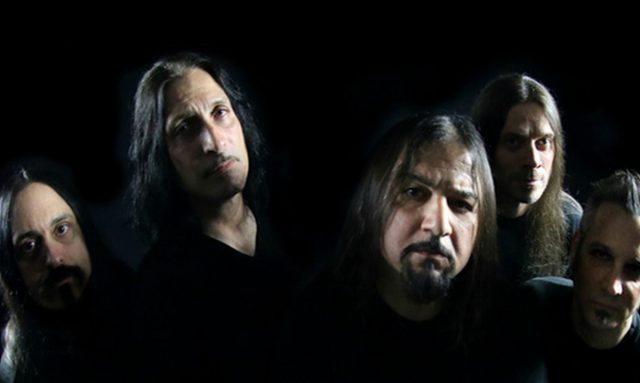
AN: Speaking of August Summer Festivals in Europe – Bloodstock in the UK is then, have you had any contact?
Sal: I’d love to be on that bill. It’s a big festival but I dunno if they’d make the offer to us to play it or not, we’d have to see. Europe is kinda like the United States now – it’s become spoilt and over-saturated. There’s a lot of bands, a lot of festivals and a lot of competition with records comin’ out all the time. It’s a case of the promoter being willing to make the offer, to take the chance and go for it, but it’s also a case of being able to afford it – you need the transport and the logistics, you need the tour manager… By all means, I’d love to play all the European festivals, but if the offer doesn’t cover the cost of touring or doesn’t help all the numbers fall into place to make such shows or dates work… [shrug.]
AN: Is there anyone you would like to go out on tour with?
Sal: There are a lot of bands I would love to go out on tour with. I don’t know if we would be considered heavy enough, but one of those bands is Triptykon. We’re big fans of Triptykon and Vanja, their bassist is a fan of ours and Tom Warrior knows us. Anytime we have been in Zurich and Vanja is home, she’s come along to our shows and we’ve met up with her a few times.
Another cool band is a band called Windhand from Richmond, VA, and they’re up and coming in Europe at the moment. I’d love to tour with them and there is something cool about the sound of a doom band with a female vocalist… Urm, other than that, COC are a cool band and I think we’d both sound great together on tour.
A lot of problems when touring with a bigger band than you is the money side of it, they don’t always wanna pay you enough money to tour with them which doesn’t help out with the logistics and then another band might come along and say we’ll do it for a lot less and bang, they get the tour spot. It’s like we were offered the COC support slot in the spring, but we needed a certain number to make it all work for us.
AN: In previous interviews, you have mentioned you are a kind of ‘Musical Hermit’ so I won’t ask the whole ‘what has impressed you in this year’s releases’ question. Instead I’ll ask this: Out of the bands you have shared the stage with this year, who would you recommend for people to check out? I really enjoyed The Transport League back in March!
Sal: Transport League for sure! We got to become real good friends with them and they’re on the same agency as us too, so I would hope to see them again sometime. They might not have been as dark as us, but it was a nice little blend of music on that tour – they were heavy but a lot groovier and upbeat; They remind me a lot of that Clutch-type of boogie groove vibe which is cool… And then we came out and crushed it with the darker sound we have. A lot of the bands we have played with this year have all been local level acts and part of those kind of packages and yeah, that’s kinda it.
AN: Have you had a chance to check out much of Liverpool?
Sal: No. We got here earlier today. We were in Dublin yesterday and we had to get the ferry across, which means we’ve been ‘up’ since like 5 am, and then it was arrive here, get to the hotel, then get to the venue, sort that bit out, then one of the girls from the venue took us out for food and then it was head back here to get ready, do the interview stuff and then it’ll be time to hit the stage.
That’s the problem with touring, you get to go everywhere, but you don’t see shit! I’d love to be able to have a look around places, but it’s like I’d need three or four days in every place to actually go around, see shit and experience it. When you have a day off on tour, all you wanna do is sleep! Performing on stage takes a lot out of me, so it’s like I just wanna spend a day off chilling. I’d love to see places, but a day off on tour is a day you’re not making money and touring costs a lot of money when you’ve got a lot of empty days… I mean we arrived here at 4pm today; we had to drop our gear off, sort things out, have somethin’ to eat… By the time I finish up tonight, I just wanna eat, shower and sleep!
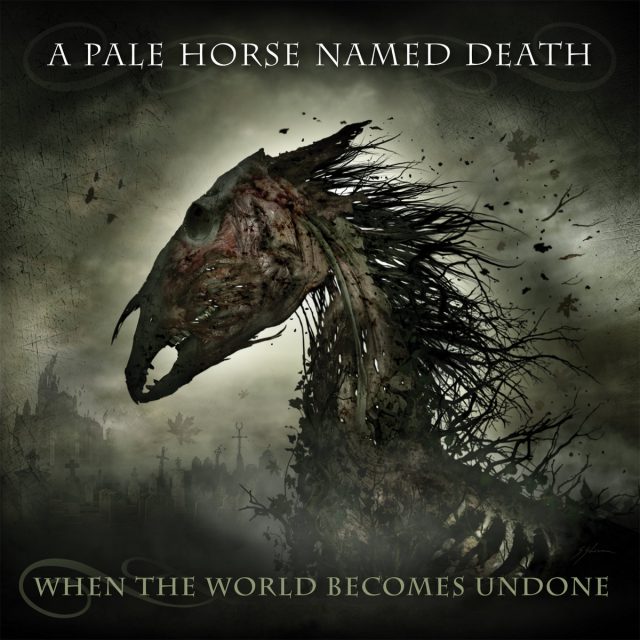
AN: Is that one of the reasons why you prefer shorter tours then?
Sal: There is that, but it’s more due to my family – it puts a lot on my wife. We have a disabled daughter and obviously, when I’m out on tour, it all falls on her and she’s so strong for holding things together. She’s my driving force, my support and to be honest, if it had not been for my wife I wouldn’t be doing this since I was always on the edge of just jumping off and just quitting.
Touring takes a lot out me too, it wears me out so like touring for three weeks or so is good if it means I can be home for six weeks, then its great and I can do it again; I need to balance it… That and family is important – especially with growing children, they need their father around. For me, they need both their mothers and their fathers around, not just a single parent family so I try my best to make it all work… It’s a kind of PTSD which musicians suffer from – always worrying about what is around the next corner.
AN: Wrapping things up; A lot of people say that A Pale Horse Named Death are the spiritual successors to the legacy which Type O Negative left behind. There are some points which are valid regarding this – the sound you have, yourself and Johnny were both in Type O Negative, both from the same area… But to me you are your own musical entity who carries that spirit on in their own way, not acting like you’re the ‘next’ Type O Negative. Do you feel any outside pressure at all to live up to any expectations associated with people believing that you are the second coming of Type O Negative?
Sal: No! It feels like to me, some people seem to wanna hang on too much, like they wanna play pin the tail on the donkey kinda thing with us… Peter was a very unique person, he had a very unique baritone voice and he had his own way of doing things… I try to do my own thing with some of the elements that I like but I have my own unique way of doing things. Yeah, there are similarities and influences like we discussed, I grew up with doing things that way and those things – the big pick scrapes, the sliding notes, the slow parts, the melodic parts, that big heavy sound, they are all parts of the fabric of my nature – we were both from similar backgrounds, into the same things and cut from the same cloth. We are not trying to do the same thing as Type O Negative did, carrying on that legacy… At least not in that way!
What we are continuing is that spirit – that spirit of where we are all from, the spirit of what we are all about, the style of music I enjoy and the beautiful sounds I create all comes from the same place as Type O Negative. To me, the work that I did with Type O Negative is the greatest achievement I have made in my life as far as I am concerned and I am deeply proud of it… And to have at least some Type O Negative fans cross over, to find some kind of solace and mutual feeling with us because they can find and relate to some pieces of that musical legacy in our sound, or because it makes them feel the same way or that they feel the same vibe, that we take them down those same dark corridors…. To me, that’s a great honour as we our own thing.
A lot of promoters wanna use those phrases “Featuring former members of Type O Negative”, on their posters and whilst it is great in a marketing sense, it draws in more people, those who may never heard of us but have heard of Type O, those who love Type O and want to catch us, those who love Type O and love us… But we are our own thing, we aren’t the next Type O Negative! It’s like I don’t want us to be pigeonholed into a corner where we only get attention because of a band we were a part of, I want people to come see us for who we are and the three albums we have created!
Just the other night for example, some of the people who turned up were shouting for us to ‘play Black Number One…
AN: [stares blankly and shakes head]
Sal: “Yeah, its like No! That song was Peter’s, it was Type O Negatives’, I’m not gonna play it… What I will play is a song of ours which has that kinda vibe, ‘Shallow Grave’ – that dancy-kinda goth song…
I have my own type of baritone voice, it’s definitely not as low as Peter’s, I don’t have his type of chest!
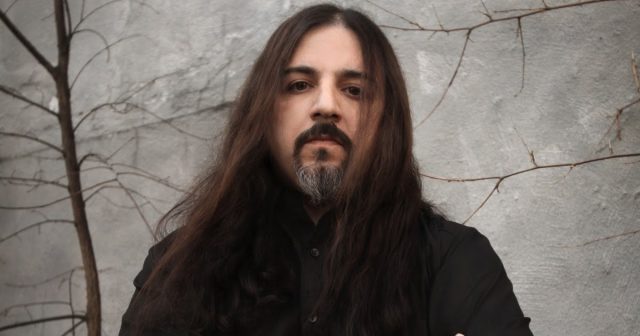
AN: I don’t think anyone does!
Sal: I have my sound and I do what I do and he did what he did and that’s just the way it is.
AN: I don’t think anyone can get as low as Peter did!
Sal: Yeah, he was a big guy!
AN: I was lucky enough to catch Type O Negative at Wacken 2007, I got on the front rail for their set and it was special! I caught you guys in Manchester in 2014 at a small club called the Roadhouse, and again, I was hanging on the edge of the stage, it was a special night, my girlfriend actually fell over Johnny outside the venue and I was all starstruck, like ‘Do you realise just who you have tripped over?’. [Sal laughs]. When I first heard you guys, I could hear that Type O Negative vibe and I dug it before I even looked into who was actually in the band! You are your own thing, the similarities and influences are there, it’s just that Type O Negative were a special thing.
Sal: Peter was a special and unique guy!
AN: Anyway, that pretty much ties this up. I’m really excited for tonight, it has been a pleasure talking with you and hope you enjoy it out there later on!
Sal: Thank you, I hope it sounds good out there for you guys!
Interview: Fraggle
Live Shots: Phil Vidamour Photography

Leave a Reply